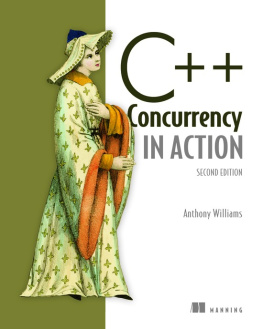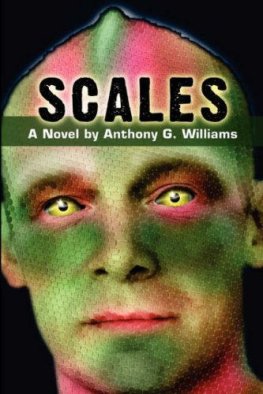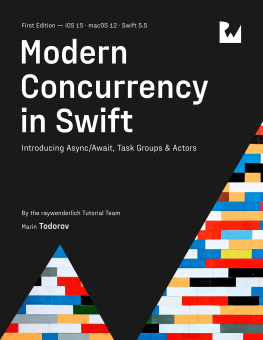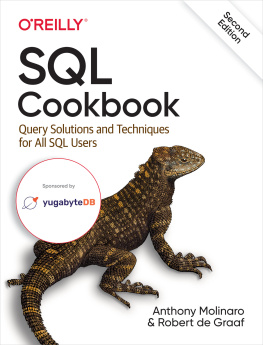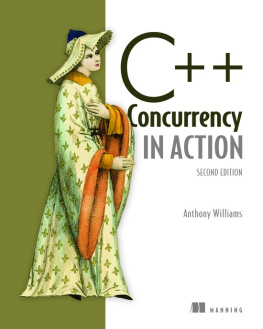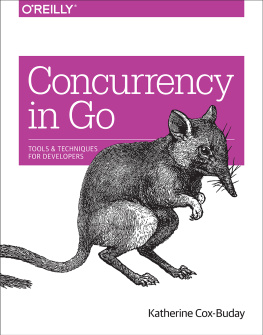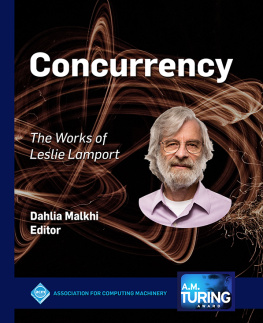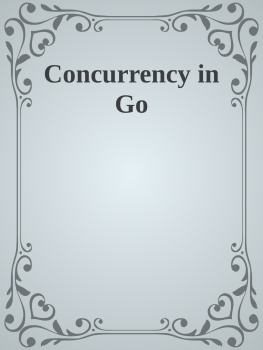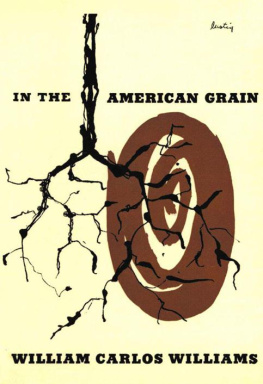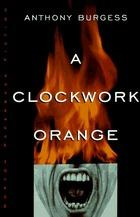Anthony Williams - C++ Concurrency in Action, Second Edition
Here you can read online Anthony Williams - C++ Concurrency in Action, Second Edition full text of the book (entire story) in english for free. Download pdf and epub, get meaning, cover and reviews about this ebook. publisher: Manning Publications, genre: Computer. Description of the work, (preface) as well as reviews are available. Best literature library LitArk.com created for fans of good reading and offers a wide selection of genres:
Romance novel
Science fiction
Adventure
Detective
Science
History
Home and family
Prose
Art
Politics
Computer
Non-fiction
Religion
Business
Children
Humor
Choose a favorite category and find really read worthwhile books. Enjoy immersion in the world of imagination, feel the emotions of the characters or learn something new for yourself, make an fascinating discovery.
- Book:C++ Concurrency in Action, Second Edition
- Author:
- Publisher:Manning Publications
- Genre:
- Rating:5 / 5
- Favourites:Add to favourites
- Your mark:
- 100
- 1
- 2
- 3
- 4
- 5
C++ Concurrency in Action, Second Edition: summary, description and annotation
We offer to read an annotation, description, summary or preface (depends on what the author of the book "C++ Concurrency in Action, Second Edition" wrote himself). If you haven't found the necessary information about the book — write in the comments, we will try to find it.
C++ Concurrency in Action, Second Edition — read online for free the complete book (whole text) full work
Below is the text of the book, divided by pages. System saving the place of the last page read, allows you to conveniently read the book "C++ Concurrency in Action, Second Edition" online for free, without having to search again every time where you left off. Put a bookmark, and you can go to the page where you finished reading at any time.
Font size:
Interval:
Bookmark:

For online information and ordering of this and other Manning books, please visit www.manning.com. The publisher offers discounts on this book when ordered in quantity. For more information, please contact
Special Sales Department Manning Publications Co. 20 Baldwin Road PO Box 761 Shelter Island, NY 11964 Email: orders@manning.com2019 by Manning Publications Co. All rights reserved.
No part of this publication may be reproduced, stored in a retrieval system, or transmitted, in any form or by means electronic, mechanical, photocopying, or otherwise, without prior written permission of the publisher.
Many of the designations used by manufacturers and sellers to distinguish their products are claimed as trademarks. Where those designations appear in the book, and Manning Publications was aware of a trademark claim, the designations have been printed in initial caps or all caps.
 Recognizing the importance of preserving what has been written, it is Mannings policy to have the books we publish printed on acid-free paper, and we exert our best efforts to that end. Recognizing also our responsibility to conserve the resources of our planet, Manning books are printed on paper that is at least 15 percent recycled and processed without the use of elemental chlorine.
Recognizing the importance of preserving what has been written, it is Mannings policy to have the books we publish printed on acid-free paper, and we exert our best efforts to that end. Recognizing also our responsibility to conserve the resources of our planet, Manning books are printed on paper that is at least 15 percent recycled and processed without the use of elemental chlorine.
 | Manning Publications Co.20 Baldwin RoadPO Box 761Shelter Island, NY 11964 |
ISBN: 9781617294693
Printed in the United States of America
1 2 3 4 5 6 7 8 9 10 SP 24 23 22 21 20 19
To Kim, Hugh, and Erin
Its not just the best current treatment of C++11s threading facilities ... its likely to remain the best for some time to come.
Scott Meyers, author of Effective C++ and More Effective C++
Simplifies the dark art of C++ multithreading.
Rick Wagner, Red Hat
Reading this made my brain hurt. But its a good hurt.
Joshua Heyer, Ingersoll Rand
Anthony shows how to put concurrency into practice.
Roger Orr, OR/2 Limited
A thoughtful, in-depth guide to the new concurrency standard for C++ straight from the mouth of one the horses.
Neil Horlock, Director, Credit Suisse
Any serious C++ developers should understand the contents of this important book.
Dr. Jamie Allsop, Development Director
I encountered the concept of multithreaded code while working at my first job after I left college. We were writing a data processing application that had to populate a database with incoming data records. There was a lot of data, but each record was independent and required a reasonable amount of processing before it could be inserted into the database. To take full advantage of the power of our 10-CPU UltraSPARC, we ran the code in multiple threads, each thread processing its own set of incoming records. We wrote the code in C++, using POSIX threads, and made a fair number of mistakesmultithreading was new to all of usbut we got there in the end. It was also while working on this project that I first became aware of the C++ Standards Committee and the freshly published C++ Standard.
I have had a keen interest in multithreading and concurrency ever since. Where others saw it as difficult, complex, and a source of problems, I saw it as a powerful tool that could enable your code to take advantage of the available hardware to run faster. Later on, I would learn how it could be used to improve the responsiveness and performance of applications even on single-core hardware, by using multiple threads to hide the latency of time-consuming operations such as I/O. I also learned how it worked at the OS level and how Intel CPUs handled task switching.
Meanwhile, my interest in C++ brought me in contact with the ACCU and then the C++ Standards panel at BSI, as well as Boost. I followed the initial development of the Boost Thread Library with interest, and when it was abandoned by the original developer, I jumped at the chance to get involved. I was the primary developer and maintainer of the Boost Thread Library for a number of years, though I have since handed that responsibility on.
As the work of the C++ Standards Committee shifted from fixing defects in the existing standard to writing proposals for the C++11 standard (named C++0x in the hope that it would be finished by 2009, and then officially C++11, because it was finally published in 2011), I got more involved with BSI and started drafting proposals of my own. Once it became clear that multithreading was on the agenda, I jumped in with both feet and authored or co-authored many of the multithreading and concurrency-related proposals that shaped this part of the standard. I have continued to be involved with the concurrency group as we worked on the changes for C++17, the Concurrency TS, and proposals for the future. I feel privileged to have had the opportunity to combine two of my major computer-related interestsC++ and multithreadingin this way.
This book draws on all my experience with both C++ and multithreading and aims to teach other C++ developers how to use the C++17 Thread Library and Concurrency TS safely and efficiently. I also hope to impart some of my enthusiasm for the subject along the way.
I will start by saying a big Thank you to my wife, Kim, for all the love and support she has given me while writing this book. The first edition occupied a significant part of my spare time for the four years before publication, and the second edition has again required a significant investment of time, and without her patience, support, and understanding, I couldnt have managed it.
Second, I would like to thank the team at Manning who have made this book possible: Marjan Bace, publisher; Michael Stephens, associate publisher; Cynthia Kane, my development editor; Aleksandar Dragosavljevi, review editor; Safis Editing and Heidi Ward, my copyeditors; and Melody Dolab, my proofreader. Without their efforts you would not be reading this book right now.
I would also like to thank the other members of the C++ Standards Committee who wrote committee papers on the multithreading facilities: Andrei Alexandrescu, Pete Becker, Bob Blainer, Hans Boehm, Beman Dawes, Lawrence Crowl, Peter Dimov, Jeff Garland, Kevlin Henney, Howard Hinnant, Ben Hutchings, Jan Kristofferson, Doug Lea, Paul McKenney, Nick McLaren, Clark Nelson, Bill Pugh, Raul Silvera, Herb Sutter, Detlef Vollmann, and Michael Wong, plus all those who commented on the papers, discussed them at the committee meetings, and otherwise helped shaped the multithreading and concurrency support in C++11, C++14, C++17, and the Concurrency TS.
Finally, I would like to thank the following people, whose suggestions have greatly improved this book: Dr. Jamie Allsop, Peter Dimov, Howard Hinnant, Rick Molloy, Jonathan Wakely, and Dr. Russel Winder, with special thanks to Russel for his detailed reviews and to Frdric Flayol, who, as technical proofreader, painstakingly checked all the content for outright errors in the final manuscript during production. (Any remaining mistakes are, of course, all mine.) In addition, Id like to thank my panel of reviewers for the second edition: Al Norman, Andrei de Arajo Formiga, Chad Brewbaker, Dwight Wilkins, Hugo Filipe Lopes, Vieira Durana, Jura Shikin, Kent R. Spillner, Maria Gemini, Mateusz Malenta, Maurizio Tomasi, Nat Luengnaruemitchai, Robert C. Green II, Robert Trausmuth, Sanchir Kartiev, and Steven Parr. Also, thanks to the readers of the MEAP edition who took the time to point out errors or highlight areas that needed clarifying.
Font size:
Interval:
Bookmark:
Similar books «C++ Concurrency in Action, Second Edition»
Look at similar books to C++ Concurrency in Action, Second Edition. We have selected literature similar in name and meaning in the hope of providing readers with more options to find new, interesting, not yet read works.
Discussion, reviews of the book C++ Concurrency in Action, Second Edition and just readers' own opinions. Leave your comments, write what you think about the work, its meaning or the main characters. Specify what exactly you liked and what you didn't like, and why you think so.

